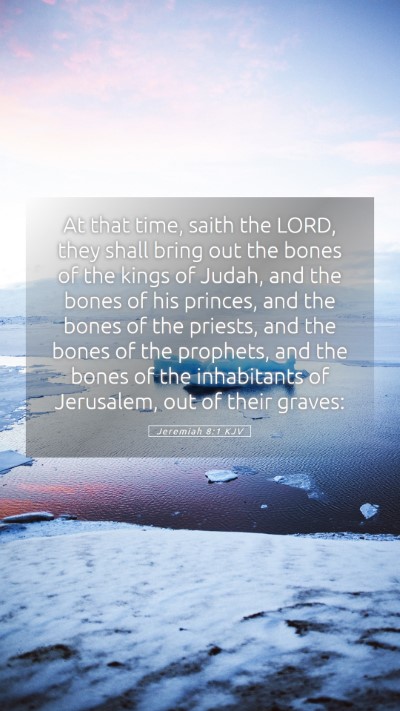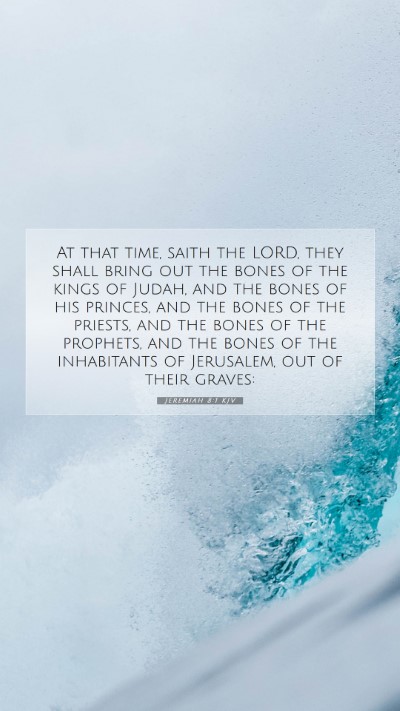Understanding Jeremiah 8:1
This passage from Jeremiah reveals profound insights into the consequences of sin and the fate of the people of Judah. As we explore the meanings of this Bible verse, we can draw from rich commentaries to deepen our understanding.
Verse Context
Jeremiah 8:1 states:
"At that time, declares the Lord, the bones of the kings and the officials of Judah, the bones of the priests and the prophets, and the bones of the people of Jerusalem will be removed from their graves."
Bible Verse Meanings
This verse's literal imagery reflects a significant truth about death, sin, and accountability before God.
Insights from Commentaries
- Matthew Henry: Henry emphasizes that this verse speaks to divine judgment. The act of removing bones from graves symbolizes the dishonor that the people will face due to their unfaithfulness. The graves represent a people's identity and legacy, which is being shattered.
- Albert Barnes: Barnes notes that this illustration emphasizes the finality of God's judgment. The bones of the priests, kings, and officials indicate that no class will be exempt from punishment. This indicates the gravity of national sin and the collective nature of Israel's unfaithfulness towards God.
- Adam Clarke: Clarke focuses on the prophetic nature of this verse, indicating that it foreshadows the destruction of Jerusalem and the ensuing desolation. The act of exposing the remains signifies a definitive break from the past, showcasing God's disdain for false worship and idolatry that the people embraced.
Key Themes in Jeremiah 8:1
- Judgment: The removal of bones signifies a judgment that is both physical and spiritual. The text warns that divine retribution is upon the nation for its idolatry.
- Severity of Sin: The verse conveys the seriousness with which God views sin, particularly through leaders who led the people astray.
- Covenant Accountability: This passage shows the deep connection between Israel's covenant with God and the consequences they face when they break it.
Applications for Modern Readers
Jeremiah 8:1 can provide Bible study insights into how spiritual leaders' actions affect the wider community. Self-reflection on leadership, both in personal and communal settings, is essential:
- Personal Accountability: Individuals must recognize their responsibility to uphold the truths of faith in their communities.
- Collective Responsibility: This verse encourages believers to support one another in faithfulness to God and to avoid the pitfalls of sin.
- Consequences of Sin: Understanding the reality of consequences should provoke humility and a sincere pursuit of repentance and righteousness.
Related Bible Cross References
- Ezekiel 37:12-14: God promises to restore His people, echoing the themes of judgment and redemption.
- Jeremiah 7:30-34: Further detail on the unfaithfulness of Israel and God’s declared judgment.
- Galatians 6:7: "A man reaps what he sows", reinforcing the principle of accountability under God's law.
Conclusion
Understanding Jeremiah 8:1 requires acknowledging the weight of sin and the unwavering standards of God's holiness. This text resonates deeply within the context of Bible verse interpretations, calling believers to seek a life of faithfulness and integrity as they navigate their spiritual journeys.
Further Study
Consider exploring additional bible study resources to deepen your understanding of prophetic literature and Israel’s history. Engaging with community bible study groups can also enhance your grasp of the significance of such verses.


